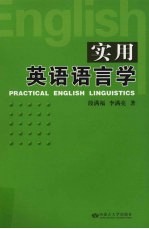图书介绍
实用英语语言学2025|PDF|Epub|mobi|kindle电子书版本百度云盘下载

- 段满福,李满亮著 著
- 出版社: 呼和浩特:内蒙古大学出版社
- ISBN:7811151847
- 出版时间:2007
- 标注页数:280页
- 文件大小:8MB
- 文件页数:298页
- 主题词:英语-语言学
PDF下载
下载说明
实用英语语言学PDF格式电子书版下载
下载的文件为RAR压缩包。需要使用解压软件进行解压得到PDF格式图书。建议使用BT下载工具Free Download Manager进行下载,简称FDM(免费,没有广告,支持多平台)。本站资源全部打包为BT种子。所以需要使用专业的BT下载软件进行下载。如BitComet qBittorrent uTorrent等BT下载工具。迅雷目前由于本站不是热门资源。不推荐使用!后期资源热门了。安装了迅雷也可以迅雷进行下载!
(文件页数 要大于 标注页数,上中下等多册电子书除外)
注意:本站所有压缩包均有解压码: 点击下载压缩包解压工具
图书目录
Chapter 1 General Linguistics:The Scope of the Subject1
1.1 The nature of language1
1.1.1 What is language?1
1.1.2 Design/Distinctive features of language4
1.1.2.1 Arbitrariness5
1.1.2.2 Linearity6
1.1.2.3 Discreteness6
1.1.2.4 Duality7
1.1.2.5 Creativity/Productivity/Open-endedness8
1.1.2.6 Displacement9
1.1.2.7 Interchangeability11
1.1.2.8 Cultural transmission11
1.1.2.9 Transferability13
1.1.3 Human language:endowment or accomplishment14
1.1.4 Language,mind and social life15
1.2 General linguistics:the scientific/systematic study of language16
1.2.1 What is general linguistics concerned with?16
1.2.2 Approaches to language18
1.2.3 The scope of linguistics20
1.3 Some important distinctions in linguistics24
1.3.1 Prescriptive grammar and descriptive grammar24
1.3.2 Langue and parole24
1.3.3 Competence and performance25
1.3.4 Etic and emic27
1.4 The data of linguistics28
Appendix29
Chapter 2 Phonetics:The Sounds of Language32
2.1 What is phonetics concerned with?32
2.1.1 The importance of phonetics33
2.1.2 Major branches of phonetics34
2.2 Mechanism of pronunciation35
2.2.1 Vocal/Speech organs:the physical aspects of pronunciation36
2.2.2 Segmentation:consonants and vowels38
2.3 The articulation of English consonant sounds40
2.4 The articulation of English vowel sounds49
2.5 Transcription of sounds52
Appendix53
Chapter 3 Phonology:The Sound Patterns of Language58
3.1 What is phonology concerned with?58
3.1.1 The difference between phonetics and phonology58
3.1.2 What is phonological theory intended to account for?59
3.2 Phoneme:the recurring element in the sound system of a language61
3.2.1 Phone,phoneme and allophone61
3.2.2 Minimal pair62
3.2.3 Phonemic contrast,complementary distribution and free variation63
3.2.4 Distinctive feature64
3.3 Syllable:the permitted patterns of arrangements of the phonological elements65
3.3.1 Sequential rules—phonological order65
3.3.2 The structure of syllable in English66
3.3.3 Sound patterning in English poetry70
3.4 Coarticulation:phonological processes in connected speech73
3.4.1 Assimilation rule73
3.4.2 Feature addition rule75
3.4.3 Deletion/Elision rule75
3.5 Supra-segmental features76
3.5.1 Stress77
3.5.2 Pitch variation81
Chapter 4 Grammar:Morphology84
4.1 Grammar84
4.1.1 What is grammar?84
4.1.2 Two dimensions of grammar:syntagmatic and paradigmatic relations85
4.2 Some basic terms/concepts in morphology86
4.2.1 Morpheme,morph,allomorph87
4.2.1.1 Morpheme87
4.2.1.2 Morph90
4.2.1.3 Allomorph90
4.2.2 Affix,root,stem,base91
4.2.2.1 Affix91
4.2.2.2 Root92
4.2.2.3 Stem92
4.2.2.4 Base93
4.2.3 Lexeme,word form,lexical entry,word,lexicon93
4.2.3.1 Lexeme93
4.2.3.2 Word form93
4.2.3.3 Lexical entry94
4.2.3.4 Word94
4.2.3.4.1 How to define word?94
4.2.3.4.2 Part of speech/word class96
4.2.3.5 Lexicon98
4.2.3.6 Token and type99
4.2.3.7 Paradigm99
4.2.3.8 Suppletion and truncation99
4.3 Idiom100
4.3.1 What is idiom?100
4.3.2 Two basic characteristics of an idiom102
4.4 Collocation103
4.4.1 What is collocation?103
4.4.2 The importance of collocation104
4.5 Allomorphy/Morpho-phonology/Morpho-phonemics107
4.5.1 Phonological conditioning108
4.5.2 Morphological/Grammatical conditioning108
4.6 Word-formation processes109
4.6.1 Derivation109
4.6.2 Compounding112
4.6.3 Other means of word-formation115
4.6.3.1 Conversion115
4.6.3.2 Acronyms/Initialisms116
4.6.3.3 Clipping117
4.6.3.4 Back-formation118
4.6.3.5 Blending118
Chapter 5 Grammar:Syntax120
5.1 What does syntax deal with?120
5.2 The subject matter of syntax:sentence121
5.2.1 What is sentence?121
5.2.2 Classification of sentence122
5.2.3 The extension of sentence122
5.2.4 Syntactic relations124
5.2.5 The relationship between sentence components or between sentences:hypotactic and paratactic relations125
5.3 The traditional approach126
5.3.1 Grammatical/Syntactic categories128
5.3.2 Concord and government134
5.4 The structural approach136
5.4.1 Syntagmatic and paradigmatic relations136
5.4.2 Immediate constituents137
5.4.2.1 Construction137
5.4.2.2 Immediate constituent analysis(IC analysis for short)137
5.4.3 Endocentric and exocentric constructions140
5.5 The generative approach141
5.5.1 Competence and performance143
5.5.2 Criteria for judging grammars144
5.5.3 Phrase structure rules144
5.5.4 Lexical insertion rules and selectional restriction rules148
5.5.5 Transformational aspect151
5.5.6 Deep and surface structures154
5.5.7 The standard theory and after155
Chapter 6 Semantics158
6.1 What is semantics concerned with?158
6.2 Some views on"meaning"160
6.2.1 The naming theory/The referential theory161
6.2.2 The conceptualist view162
6.2.3 Behaviorism164
6.2.4 Contextualism165
6.2.5 Functionalism166
6.2.6 Mentalism166
6.3 Different meanings of meaning166
6.3.1 Conceptual meaning167
6.3.2 Associative meaning167
6.3.2.1 Connotative meaning168
6.3.2.2 Social meaning/Stylistic meaning168
6.3.2.3 Affective meaning169
6.3.2.4 Reflected meaning169
6.3.2.5 Collocative meaning169
6.3.3 Thematic meaning170
6.4 Word meaning/Lexical meaning170
6.4.1 Synonymy171
6.4.2 Homonymy177
6.4.3 Hyponymy178
6.4.4 Antonymy179
6.4.5 Polysemy181
6.4.6 Semantic adalysis/Componential analysis—a way to analyze lexical meaning182
6.5 Sentence meaning184
6.5.1 Predication analysis—a way to analyze sentence meaning185
6.5.2 Selection restriction186
6.5.3 Sense relations between sentences188
Chapter 7 Pragmatics190
7.1 What is pragmatics?190
7.1.1 Definition of pragmatics190
7.1.2 Distinction between semantics and pragmatics192
7.1.3 Context193
7.2 Deictics194
7.3 Speech act theory197
7.3.1 Performatives and constatives198
7.3.2 Speech acts200
7.3.3 Types of illocutionary acts203
7.3.4 Indirect speech acts205
7.4 The cooperative principle and implicature207
7.4.1 What is implicature?207
7.4.2 The cooperative principle209
7.4.3 Violation of the maxims and the production of conversational implicature212
7.5 The politeness principle215
Bibliography(For chapter 1-7)219
Chapter 8 Sociolinguistics223
8.1 Introduction223
8.2 Definition and relation to linguistics223
8.3 Scope of sociolinguistic study224
8.4 Code,code-switching and code-mixing224
8.5 Different approaches to code-switching studies226
8.5.1 Linguistic approach227
8.5.1.1 Language constraints228
8.5.1.2 Inter-sentential,intra-sentential and tag code-switching229
8.5.1.3 Alternational and insertional code-switching230
8.5.2 Sociolinguistic approach231
8.5.2.1 Social functions231
8.5.2.2 Social motivations233
8.5.2.3 Power and solidarity235
8.5.2.4 Communicative strategy236
8.5.3 Functional linguistics approach238
8.5.4 Other approaches240
8.5.5 Studies of code-switching in different discourse genres240
8.6 Summary and evaluation241
References243
Chapter 9 Systemic-Functional Linguistics248
9.1 Introduction248
9.2 Metafunctions249
9.2.1 Ideational metafunction249
9.2.2 Interpersonal metafunction255
9.2.3 Textual metafunction256
9 3 Register and genre258
9.4 Context260
9.5 Application of systemic-functional linguistics262
9.5.1 General introduction262
9.5.2 A case study262
9.6 Summary264
Appendix265
References266
Chapter 10 Discourse Analysis268
10.1 Introduction268
10.2 A note on terminology268
10.3 Different approaches to discourse analysis269
10.4 An example of functional discourse analysis270
10.4.1 Introduction270
10.4.2 Analysis of the cohesive devices271
10.4.2.1 Reference271
10.4.2.2 Substitution272
10.4.2.3 Ellipsis273
10.4.2.4 Conjunction274
10.4.2.5 Lexical cohesion275
10.4.3 Concluding remark277
10.5 Summary and implications277
Appendix278
References279
热门推荐
- 2723508.html
- 1523019.html
- 3610543.html
- 431226.html
- 3346542.html
- 3327257.html
- 783940.html
- 3082248.html
- 2398163.html
- 1110279.html
- http://www.ickdjs.cc/book_2129446.html
- http://www.ickdjs.cc/book_1724140.html
- http://www.ickdjs.cc/book_3862895.html
- http://www.ickdjs.cc/book_2918775.html
- http://www.ickdjs.cc/book_1852094.html
- http://www.ickdjs.cc/book_480545.html
- http://www.ickdjs.cc/book_3524044.html
- http://www.ickdjs.cc/book_126228.html
- http://www.ickdjs.cc/book_302102.html
- http://www.ickdjs.cc/book_87153.html